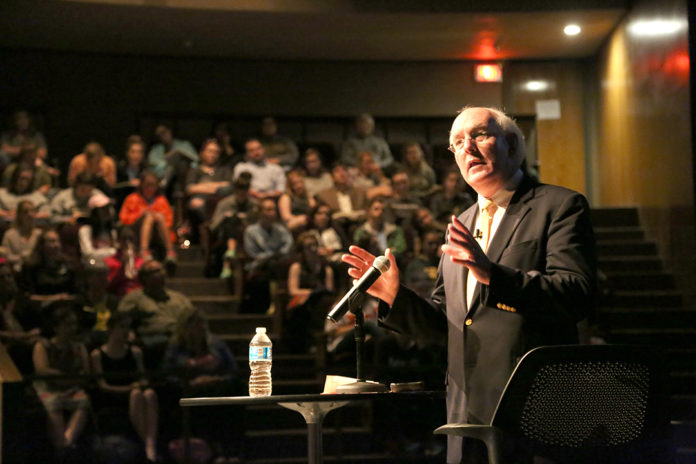
By Lindsey McLemore | Reporter
Dr. Paul Hayes Tucker spoke about the life and works of Claude Monet, his techniques, reputation and legacy. The lecture took place in the Mabee Theatre Thursday, however, an overflow guests were sent to the Allbritton Institute Lecture Hall to watch the lecture via livestream.
Tucker is a professor at the University of Massachusetts Boston and the world’s leading authority on Monet. He was the featured speaker for this year’s annual The Allbritton Art Institute,
The Allbritton Art Institute, founded in 1998, promotes the appreciation and study of artists and art movements of the 19th, 20th and 21st centuries through lectures, field trips and studies around the world.
Dr. Sean DeLouche, lecturer of introductory art and 19th century art history, introduced Tucker described his contributions to art history in his more than 40-year career as being “undeniably influential, with published works spanning 11 books.”
Tucker depicted Monet as being a proud and confident artist and teacher from the start of his career, “subscribing to at least two press clipping services so that he could follow his own mention and reputation with the public,” Tucker said.
“Monet was not just the man sitting in nature and letting his heavy emotions be turned into paintings. There was so much more to him than that.”
Throughout the lecture, Tucker shed light on some of the often unmentioned efforts that went into his work and legacy.
Tucker specifically noted Monet’s ability to turn sacred entities like cathedrals into secular art and how many of the paintings depicting nature were born in nature but then taken to Monet’s studio to make the painting look more natural in an unnatural, gallery environment.
Many of these paintings are a combination of experience, memory, and recollection,” Tucker said.
Temple senior Rachel Anthony studies studio art and found Tucker’s lecture to be especially enlightening.
“It was interesting to listen to an art historian talk about an artist as if he really knew them,” Anthony said. “In a classroom setting, a lecture can be stuffy, but [Tucker] really seemed to know Monet. Listening to him was easy. It’d be hard not to be interested in what he had to say.”
After his lecture, Tucker took time to answer audience questions from the Mabee Theatre about Monet’s later life and works and Tucker’s thoughts on digital painting and contemporary art, which he enjoys.





